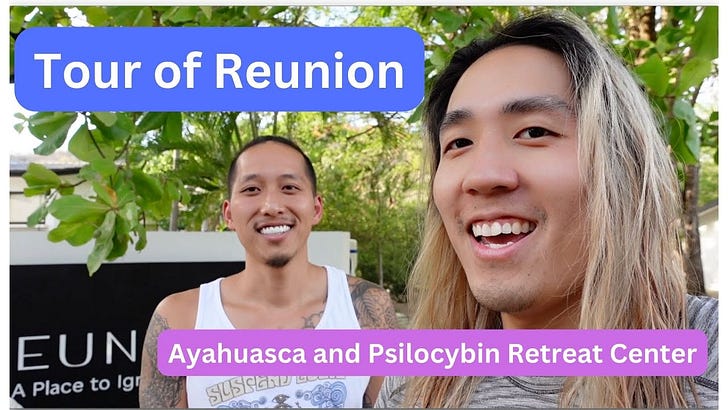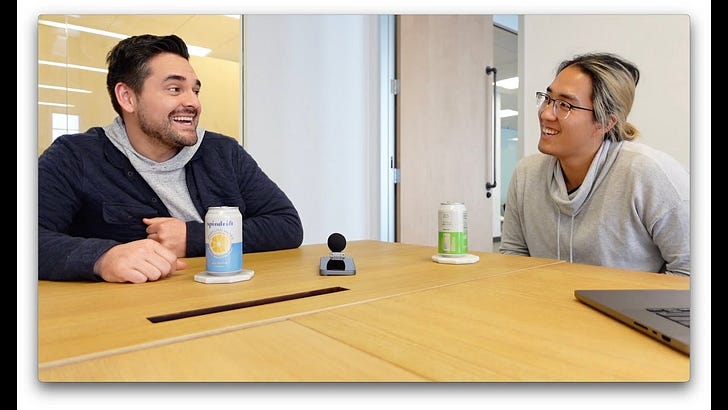Watch
Spotify: https://podcasters.spotify.com/pod/show/jeff-tang/episodes/Kai-McKinney-e21khf1
Apple:
YouTube:
Kai
✨ Highlights by GPT-3.5 ✨
"Moving balance" means to embrace fluidity and stay in motion, rather than being static and falling over.
Founders often struggle with having too much conviction and betting on themselves to the extent of forgetting the point or better options.
Knowing when to pivot is difficult, but it's important to be able to cut your losses when a project is not going in the right direction.
Young founders who get it right the first time often have been hacking for many years.
Building an agency can provide exposure to different industries and verticals, similar to consulting, and can be a way to gain experience and knowledge.
Increasing commitment tends to increase opportunities, as it gives a clear direction and purpose.
The desire for optionality, or the ability to explore multiple paths and opportunities, is a core issue of our times, stemming from the move away from religion and core doctrines to align oneself to.
Immigrant children often feel a sense of obligation to their parents, which can lead them to prioritize practicality and stability over their childhood ambitions.
Kai's parents' business was not affected by the 2008 recession that caused many of their peers to lose their jobs and stability, leading Kai to lose trust in corporate stability.
Some of the notes that Kai's dad left him include: "never do something to run away," "only make big changes when you're running towards something," and "are you fighting against something or for something?"
My Prep Notes and Questions
pivoting, conviction, commitment, sunk-cost
Conviction is the complementary force that keeps us straight. But of course, conviction at its extremes threatens to blind us, to lead us astray. As ever, we must keep it in balance. And this balance, like the wind through the trees or the current of a river, changes constantly. This constant adjustment, this moving balance, is life’s truest dynamic. It is what defines our lives, and the means by which we will achieve ourselves.
What does moving balance, the name of your Substack, mean to you?
How did you have the conviction to found a product studio out of college?
relentless iteration and dogged insistence
Helm has been a lot of things over the past couple years. It’s a running joke: you guys pivoted again?
The sunk cost fallacy has a huge effect on proper iteration, so a lot of companies keep burning resources (and energy) in the wrong direction
Can you briefly cover some of the iterations Helm went through?
How do we as founders know when to have conviction, be patient, and distort reality to our image of the world versus when we are just clinging to an old identity and cannot get over sunk costs?
This year started with the deconstruction of the former version of my life, moving on from a deep relationship and the business I’d spent four years of my life building with some of my best friends. When you do something deeply, obsessively, you risk forgetting yourself at the other end. It took me a while to find myself again.
How did you know it was time to move on?
Can you elaborate on what you mean by forgetting yourself at the other end?
How did you rediscover yourself again?
Every time I’ve read into an overnight sensation, I find a long lead-up of failed businesses, years of zero revenue, and lots of pivots. Startups typically find the magical product-market fit after 4 years, and founders find success after 4 attempts.
4 years for finding pmf & 4 attempts to find success as a founder intuitively sounds right to me. How did you find this rule of thumb?
In the past, I’d optimized for optionality—keeping doors open. The problem was that I never walked through them, because that felt irreversible. I felt that I was supposed to do something great, but I found that I’d hedge my bets instead of going all in. This time, I was playing with a chip on my shoulder and nothing to lose. I went all in.
So, the only thing we can hope to do is increase opportunity, make thorough decisions, and commit to them. There are two ways to do this: by increasing optionality (breadth) or by increasing commitment (depth). Counterintuitive as it seems, commitment tends to beget opportunity. It gives you direction.
Why do you think 20 something year old struggle so much with optionality vs commitment, explore vs exploit?
How did you arrive at the counterintuitive insight that commitment, not optionality or hedging, creates opportunity?
identity, family
finding identity in the things we build
Immigrant parents are known for tough love. Suffer now—work hard, study, focus—enjoy later. Many parents, regardless of immigrant status, are also known to project their desires onto their children. The combination of the two, plus the weight of obligation, can break you.
Even if this projection is not direct, it’s often implicated. Sometimes, it’s cultural. A major tenant of Chinese culture is filial piety (孝) - a “virtue of respect for one's parents, elders, and ancestors.” What do we owe? How do we repay?
Many immigrant kids pay their debt of obligation by trading their childish ambitions for pragmatic ones. A career in the arts becomes a career in accounting. Stability and practicality become the predominant criteria for decision making.
My mom thinks this is a travesty. Did I make all of these sacrifices only for you to make them too? “The point of all this,” she says, “is for you to achieve yourself. Not my idea of you, but yours”
Both of your parents are entrepreneurs. How did that play a role in your life?
You are a half Chinese half American. How did this background affect your worldview?
I heard that your dad left you notes on life. What was your favorite note from him?
product studio / agency
relentless iteration → skin in the game
That was in May. Seven months later, my world feels fundamentally different. With an incredible team behind it, Relay is now a seven-figure company with twenty people in the Slack.
Essentially, we’re acting as fractional CTOs or product managers, not only building but developing strategy as long-term partners. In exchange, we’re charging a fair rate while retaining some long-term stake (think RSAs or advisory shares). The big idea: skin in the game.
How did you decide on the product studio model?
How were you able to get to 7 figs in revenue so fast?
Do you believe more product studios will be created in the next decade?
How do you balance working with and employing friends?
I heard you got burnt once by an early client (performed $1000s in work for them and got left on the hook for costs)… what did you learn from that?
How are you sharing equity and revenue amongst the team?
ohio
I’m born and raised in Cincinnati, Ohio, but have mostly been away since I graduated high school. Why did you decide to stay in Columbus, Ohio vs NYC or SF?
closing notes
What founders do you wanna give a shoutout to, who inspire you, and who i should have on the pod next?
What advice would you have any founders considering a pivot right now?
What advice would you have any founders going through a pivot right now?







Share this post